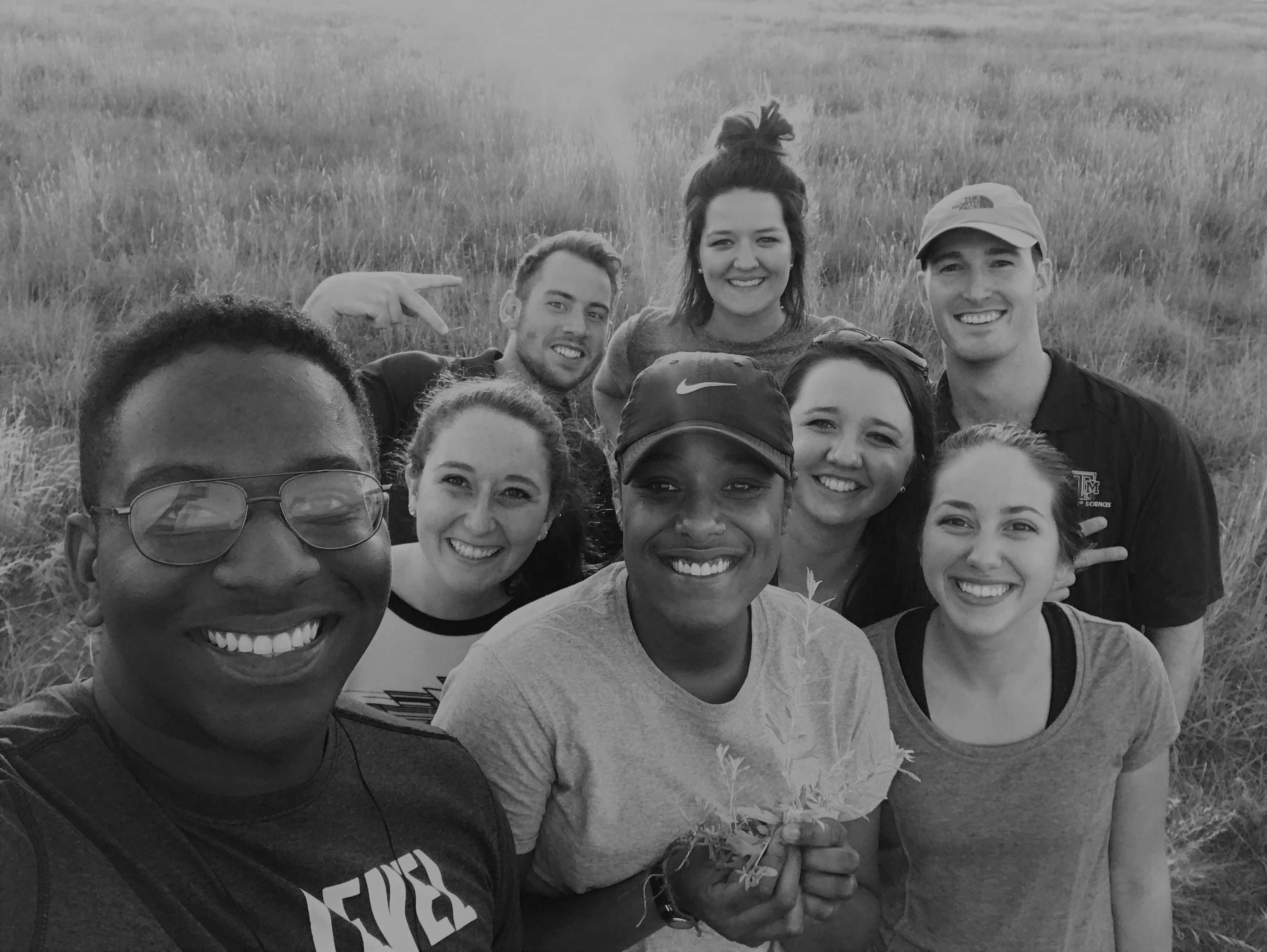Although all 8 of us have the same title, we have all had our own unique experiences as AgriCorps Fellows. In the past year we have laughed, cried, been angry, happy, and every other emotion you could ever imagine. We have gone through loss with each other and experienced new life. We have grown, both individually, and together. We have all come from differing backgrounds and are all headed in different directions. And although we have all shared an incredible experience with each other, each experience has been unique and special to us as individuals. The next few passages are small pieces of experiences or perspectives we have gained through our year as fellows.
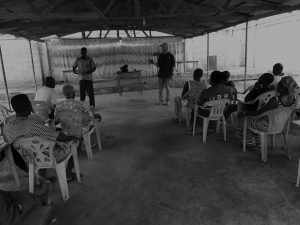 Ryan Tomlin: “I have always felt life is about perspective. This past year has changed mine in ways I never fathomed possible, and I’ll never forget the people I shared a cutlass, sweat, and tears with. I have had the pleasure to meet some truly genuine people that care more about others than materials or themselves. Being a fellow is about having a belief in others and instilling an idea that they can accomplish anything they set their sights on. I have grown close to my community by learning about individual’s stories and developing relationships that will last a lifetime. Leaving will be difficult, but we must trust that what we began will continue to grow and develop.”
Ryan Tomlin: “I have always felt life is about perspective. This past year has changed mine in ways I never fathomed possible, and I’ll never forget the people I shared a cutlass, sweat, and tears with. I have had the pleasure to meet some truly genuine people that care more about others than materials or themselves. Being a fellow is about having a belief in others and instilling an idea that they can accomplish anything they set their sights on. I have grown close to my community by learning about individual’s stories and developing relationships that will last a lifetime. Leaving will be difficult, but we must trust that what we began will continue to grow and develop.”
Hope Sorrells: “As I sit here, I close my eyes and reminisce back to my first day in country; to the stickiness of the humidity; to meeting my host family and then getting completely adjusted and comfortable living in my  community… I have two words that come to mind. These are “family” and “connection.” Which these words work simultaneously together to form the meaning of being a part of something greater than myself. I have another family in Akropong, Ghana. I have sisters, brothers, and a mother. They mean the world to me. The idea that I have a global connection to people who brought an outsider into their family and treated me as if I were born and raised with them. I was scolded, given love, taught new things, given life advice, laughed until I cried, learned to enjoy little moments, worked hard, and valued every single day. I know that, no matter where this life takes me, I can take my memories of my family with me wherever I go, along with all of the life lessons that living in the U.S. would have never taught me.”
community… I have two words that come to mind. These are “family” and “connection.” Which these words work simultaneously together to form the meaning of being a part of something greater than myself. I have another family in Akropong, Ghana. I have sisters, brothers, and a mother. They mean the world to me. The idea that I have a global connection to people who brought an outsider into their family and treated me as if I were born and raised with them. I was scolded, given love, taught new things, given life advice, laughed until I cried, learned to enjoy little moments, worked hard, and valued every single day. I know that, no matter where this life takes me, I can take my memories of my family with me wherever I go, along with all of the life lessons that living in the U.S. would have never taught me.”
Megan Harper: “During this journey, I have learned to love people without expectation (some I can’t even communicate with verbally). I have learned to stand up for myself, set boundaries, a take care of myself. I have 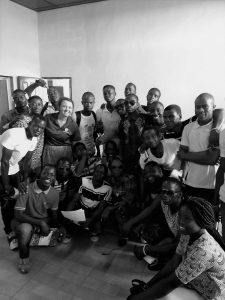 learned the beauties and cruelties of this world do not claim just one nation, but all. Knowing my fellowship had an approaching end date, I learned to live far more presently than ever before. Teaching my students has easily been the greatest joy of my life. My classroom was a place of boundaries and rules. For many of my learners, it was the first place they couldn’t talk their way out or bribe their way out of consequences. In a place where there is little to no consequences or justice for wrong, I find that the greatest thing I can do to help my students (far greater than solely giving them more technical information on leadership or agriculture) is setting high expectations and accompanying consequences. Right and wrong can become the blandest, luke-warm grey anyone has ever seen if we let it. However, in my 4 walls for 4 straight hours on Monday, Wednesday, and Friday, there is structure and order. My students know the consequence of coming late is -10 points to start the day. They came to refer to punctual/on time as “Ms. Harper Time.” They know the outcome of participating twice (whether it be asking a question or answering a question) is +20. They know they must be +10 by the end of the day to earn participation points. Because there are expectations and consequences in my classroom, there is responsibility. There is genuine learning. Most of all, there is empowerment. Being a fellow cultivates living with intention, empowering with action, and most of all, believing tomorrow can be better for everyone.”
learned the beauties and cruelties of this world do not claim just one nation, but all. Knowing my fellowship had an approaching end date, I learned to live far more presently than ever before. Teaching my students has easily been the greatest joy of my life. My classroom was a place of boundaries and rules. For many of my learners, it was the first place they couldn’t talk their way out or bribe their way out of consequences. In a place where there is little to no consequences or justice for wrong, I find that the greatest thing I can do to help my students (far greater than solely giving them more technical information on leadership or agriculture) is setting high expectations and accompanying consequences. Right and wrong can become the blandest, luke-warm grey anyone has ever seen if we let it. However, in my 4 walls for 4 straight hours on Monday, Wednesday, and Friday, there is structure and order. My students know the consequence of coming late is -10 points to start the day. They came to refer to punctual/on time as “Ms. Harper Time.” They know the outcome of participating twice (whether it be asking a question or answering a question) is +20. They know they must be +10 by the end of the day to earn participation points. Because there are expectations and consequences in my classroom, there is responsibility. There is genuine learning. Most of all, there is empowerment. Being a fellow cultivates living with intention, empowering with action, and most of all, believing tomorrow can be better for everyone.”
Carrie Stephens: “To me, being a fellow is about constantly learning as you go. When you come to another 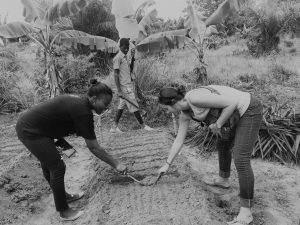 country, it’s hard to not have ideas about what to do or how everything is going to be, but you never can truly estimate the impact that others will have on you, and how much your perception of the place and the people will change over time. Being a fellow means admitting when you have failed, but using the failures to improve; taking in the small moments and realizing that they will be some of the most memorable and most impactful; truly living with the people around you so that you can better understand the whys and the hows; never thinking that you know more than the people here, but being confident in yourself; and most of all, remembering that some days it’s okay to not be okay, but making sure to relish in the moments that are truly and genuinely joyful.”
country, it’s hard to not have ideas about what to do or how everything is going to be, but you never can truly estimate the impact that others will have on you, and how much your perception of the place and the people will change over time. Being a fellow means admitting when you have failed, but using the failures to improve; taking in the small moments and realizing that they will be some of the most memorable and most impactful; truly living with the people around you so that you can better understand the whys and the hows; never thinking that you know more than the people here, but being confident in yourself; and most of all, remembering that some days it’s okay to not be okay, but making sure to relish in the moments that are truly and genuinely joyful.”
Sayvanna SFabian: “Being at service is something that I have always had a passion for, and agriculture education 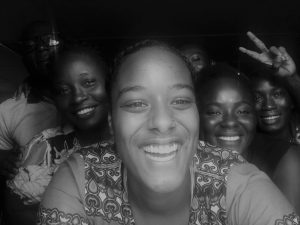 certainly is all about that. Coming to West Africa to work and live with communities with 4-H clubs was no different in that mission. However, to my surprise after living in my community and working with my students and county 4-H clubs, did I truly realize that international work was less about service and more about perspective. International volunteerism, at least the way we AgriCorps Fellows work, is about a heart change. Only after I ‘failed’ for the umpteenth time, did I realize that my work was less about getting students to understand agricultural theory or best farming practices and more about connecting with people, hearing their stories, learning about their triumphs and failures and letting that inspire and motivate you through the times when you feel unmotivated, downtrodden and disheartened. What I learned the most as a fellow in Liberia, is that I have gained a home away from home in my community and a family away from family in my students and friends. For that, I will be forever grateful.”
certainly is all about that. Coming to West Africa to work and live with communities with 4-H clubs was no different in that mission. However, to my surprise after living in my community and working with my students and county 4-H clubs, did I truly realize that international work was less about service and more about perspective. International volunteerism, at least the way we AgriCorps Fellows work, is about a heart change. Only after I ‘failed’ for the umpteenth time, did I realize that my work was less about getting students to understand agricultural theory or best farming practices and more about connecting with people, hearing their stories, learning about their triumphs and failures and letting that inspire and motivate you through the times when you feel unmotivated, downtrodden and disheartened. What I learned the most as a fellow in Liberia, is that I have gained a home away from home in my community and a family away from family in my students and friends. For that, I will be forever grateful.”
Merle Mullet: “One of the first things I remember learning about the mission of AgriCorps was memorizing the poem by Lao Tzu, “But with the best leaders, when the work is done, the task accomplished, the people will say ‘We 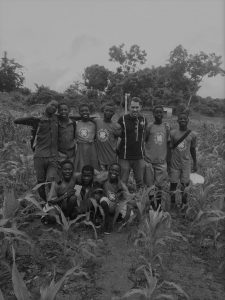 have done it ourselves.’” It is a challenging reminder that for those aiming to have enduring impact, they must seek to be forgotten. This is how I attempted to begin and end my time in the Ghanaian village of Akatakyiwa. Recently, I was in conversation with a long-time family friend, and he asked me a question I’d not yet considered: “What would you say is the highlight of your experience in Ghana?” To be honest, I was a little taken aback by the question, because I was expecting curious musings regarding my diet or transportation—regardless of my surprise, however, it wasn’t difficult for me to quickly formulate a response, as it had constantly been on the forefront of my mind during these final months. Recently, we had a workshop with 130 students where they were taught entrepreneurship, post-harvest crop storage, the importance of leadership, and conservation agriculture techniques. What made this program special was not the educational material, but the fact that all these topics were discussed in the Ghanaian language, by Ghanaian agriculture professionals, and about half of the cost of the program itself was willingly borne by local Ghanaian businesses and individuals. Though this event was only one of the many highlights of my time here in Ghana, its structure serves as an example of the long-term impact that I intend to have in my community. I went to the people. I lived with them, learned from them, and loved them. We started with what they knew and built with what they have. I continually reminded community members and students that all the progress they may see of have experienced is a result of their effort. My hope is that when someone visits the thriving community of Akatakyiwa in 20 years and asks who has brought all this prosperity into their lives, the people of Akatakyiwa will confidently reply, “We have done it ourselves.””
have done it ourselves.’” It is a challenging reminder that for those aiming to have enduring impact, they must seek to be forgotten. This is how I attempted to begin and end my time in the Ghanaian village of Akatakyiwa. Recently, I was in conversation with a long-time family friend, and he asked me a question I’d not yet considered: “What would you say is the highlight of your experience in Ghana?” To be honest, I was a little taken aback by the question, because I was expecting curious musings regarding my diet or transportation—regardless of my surprise, however, it wasn’t difficult for me to quickly formulate a response, as it had constantly been on the forefront of my mind during these final months. Recently, we had a workshop with 130 students where they were taught entrepreneurship, post-harvest crop storage, the importance of leadership, and conservation agriculture techniques. What made this program special was not the educational material, but the fact that all these topics were discussed in the Ghanaian language, by Ghanaian agriculture professionals, and about half of the cost of the program itself was willingly borne by local Ghanaian businesses and individuals. Though this event was only one of the many highlights of my time here in Ghana, its structure serves as an example of the long-term impact that I intend to have in my community. I went to the people. I lived with them, learned from them, and loved them. We started with what they knew and built with what they have. I continually reminded community members and students that all the progress they may see of have experienced is a result of their effort. My hope is that when someone visits the thriving community of Akatakyiwa in 20 years and asks who has brought all this prosperity into their lives, the people of Akatakyiwa will confidently reply, “We have done it ourselves.””
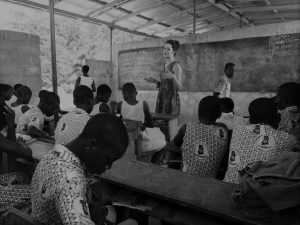 Ellen Lupkes: “Frustrated and sick of the buzzing flies that had taken over the teacher’s office, I grabbed the hammer and headed out to the garden. The fence needed to be fixed and no one was doing anything despite my repeated pleas at 4-H meetings. So, I went out, in my dress, and started fixing the fence. Low and behold, the students soon followed. We repaired the fence, planted maize, and weeded the nursery beds that day. I was so busy waiting for someone else to take the initiative that I had forgotten the most important part of being a leader isn’t always effectively delegating, but rather creating an example to follow.”
Ellen Lupkes: “Frustrated and sick of the buzzing flies that had taken over the teacher’s office, I grabbed the hammer and headed out to the garden. The fence needed to be fixed and no one was doing anything despite my repeated pleas at 4-H meetings. So, I went out, in my dress, and started fixing the fence. Low and behold, the students soon followed. We repaired the fence, planted maize, and weeded the nursery beds that day. I was so busy waiting for someone else to take the initiative that I had forgotten the most important part of being a leader isn’t always effectively delegating, but rather creating an example to follow.”
Eli Hugghis: “Planting seeds for trees that you will never be able to enjoy the shade from. Throughout my time as a 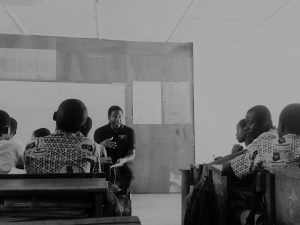 fellow, some of my favorite times were random conversations that I would have with my students outside of the classroom. We would talk about anything from what life was like for me in the United States, favorite foods, and Dr. Pimple Popper videos; to the need for working in the country that you’re from and returning if you go to school abroad, to why I became and agriculturalist, and to how they can be better leaders as youth in the community. To have hope and assurance that the next generation will be better than those passed, we must take the time to invest in the youth, care about them, and be there for them. Seeds to creating a better society after we are gone.”
fellow, some of my favorite times were random conversations that I would have with my students outside of the classroom. We would talk about anything from what life was like for me in the United States, favorite foods, and Dr. Pimple Popper videos; to the need for working in the country that you’re from and returning if you go to school abroad, to why I became and agriculturalist, and to how they can be better leaders as youth in the community. To have hope and assurance that the next generation will be better than those passed, we must take the time to invest in the youth, care about them, and be there for them. Seeds to creating a better society after we are gone.”
Thank you for reading our stories from throughout the year, and we hope you enjoyed our eight shades of an AgriCorps Fellow!


